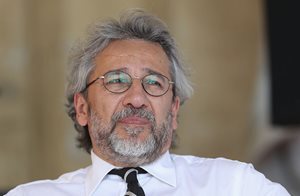For weeks after the October 2 disappearance of a Saudi journalist, Jamal Khashoggi, after he entered the Saudi Consulate in Istanbul, Turkish President Recep Tayyip Erdoğan has behaved like the leader of a Western democracy: He feared there might have been a murder of the Saudi journalist, which Saudi officials later admitted; speaking loud and louder, he asked the Saudi authorities to bring the journalist’s killers to justice; he offered them a trial in Turkey, and asked for their extradition; he urged the House of Saud to find and hand over to justice those who may have ordered the murder. He also shared audio evidence of the murder with Western leaders. Yet Erdoğan’s public image in the more civilized parts of the world looks closer to that of the Saudi royals than to any Western leader. For that, he only has himself to blame.

In 2016, journalist Can Dündar (pictured), along with his colleague Erdem Gül, was sentenced to five years in prison in Turkey for “revealing state secrets” after a front-page story in Cumhuriyetdetailed how Turkey’s security services had sent arms shipments to radical jihadis fighting in Syria. (Photo by Sean Gallup/Getty Images)
“Erdoğan championing the basic human rights of a journalist” sounds grossly oxymoronic. In its annual report in December, the Committee to Protect Journalists wrote:
“Turkey remains the world’s worst jailer for the second consecutive year, with 73 journalists behind bars, compared with 81 last year. Dozens more still face trial, and fresh arrests take place regularly”.
For Erdoğan, apparently, as for the Saudis, there are “good journalists” and “bad journalists.” He often refers to the latter group as “terrorists” and “traitors.” One such journalist is Can Dündar, former editor-in-chief of the secular, left-wing Cumhuriyet daily. In 2016, Dündar, along with his colleague Erdem Gül, was sentenced to five years in prison for “revealing state secrets” after a front-page story in Cumhuriyet detailed how Turkey’s security services had sent arms shipments to radical jihadis fighting in Syria. Shortly before a court in Ankara announced the verdict, Dündar narrowly escaped an attack by a gunman outside the courthouse. Instead, a television reporter who was covering the trial was injured by a stray bullet. The gunman was apparently an Erdoğan sympathizer who confessed to having been provoked by news accusing Dündar of high treason.
In a hearing in October the gunman was sentenced to 5,000 liras (approximately $900). The injured journalist, Yağız Şenkal, commented: “This fine is even smaller than what I had to pay the hospital for my injuries.”
This kind of “Islamic” justice is not unknown in Turkey. In 2007 Hrant Dink, a Turkish-Armenian journalist, was shot in the head three times by a teenager who was caught and confessed to the killing on ‘nationalist aspirations.’ During his interrogation, the killer was given a red-carpet treatment by police officers who posed to cameras with the boy, in front of a Turkish flag, everyone smiling, as if they were greeting a national hero. In a 2010 verdict, the European Court of Human Rights ruled that the Turkish state had failed to protect the life of Dink. The ruling said:
“The court took the view that the Turkish security forces could reasonably be considered to have been aware of the intense hostility towards Hrant Dink in nationalist circles ... None of the three authorities informed of the planned assassination and its imminent realisation had taken action to prevent it.”
Burak Bekdil, one of Turkey’s leading journalists, was recently fired from the country’s most noted newspaper after 29 years, for writing in Gatestone what is taking place in Turkey. He is a Fellow at the Middle East Forum.






